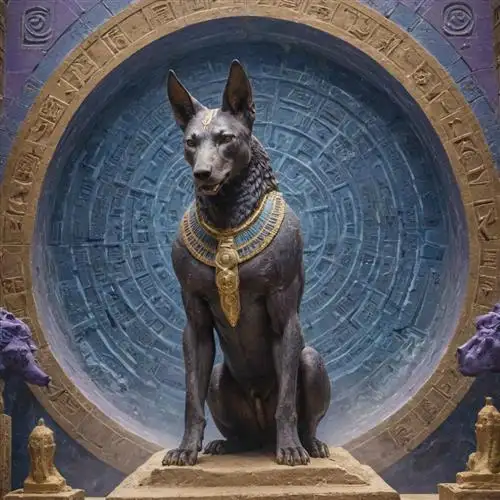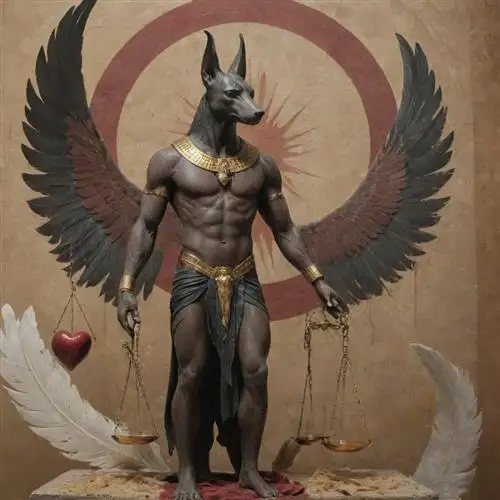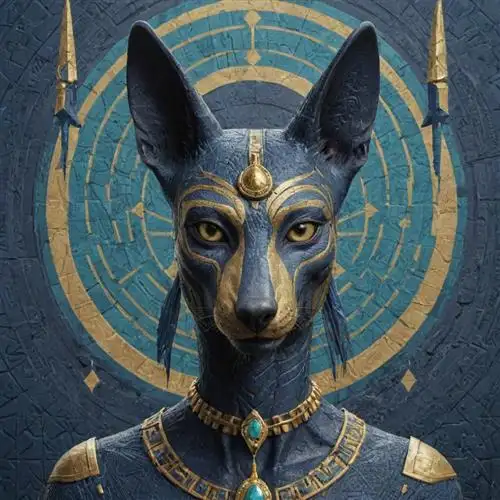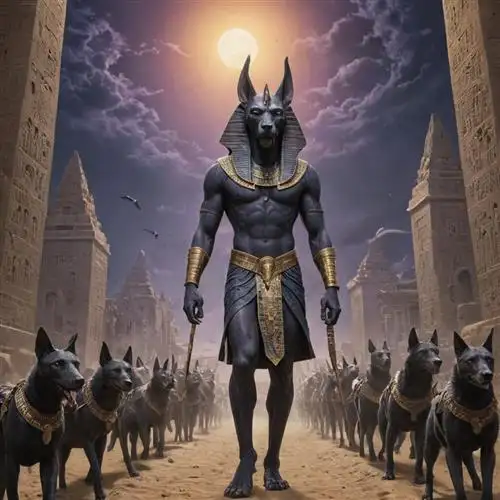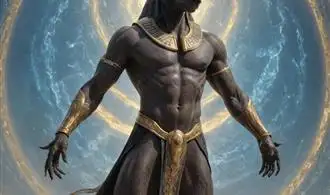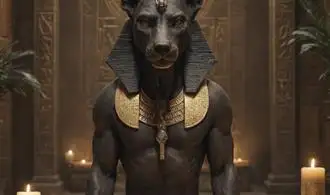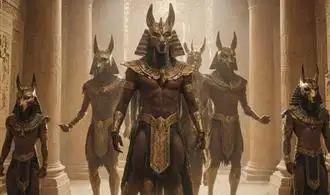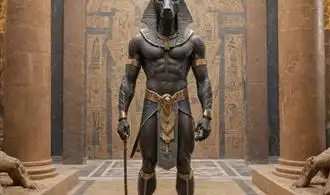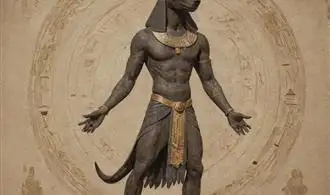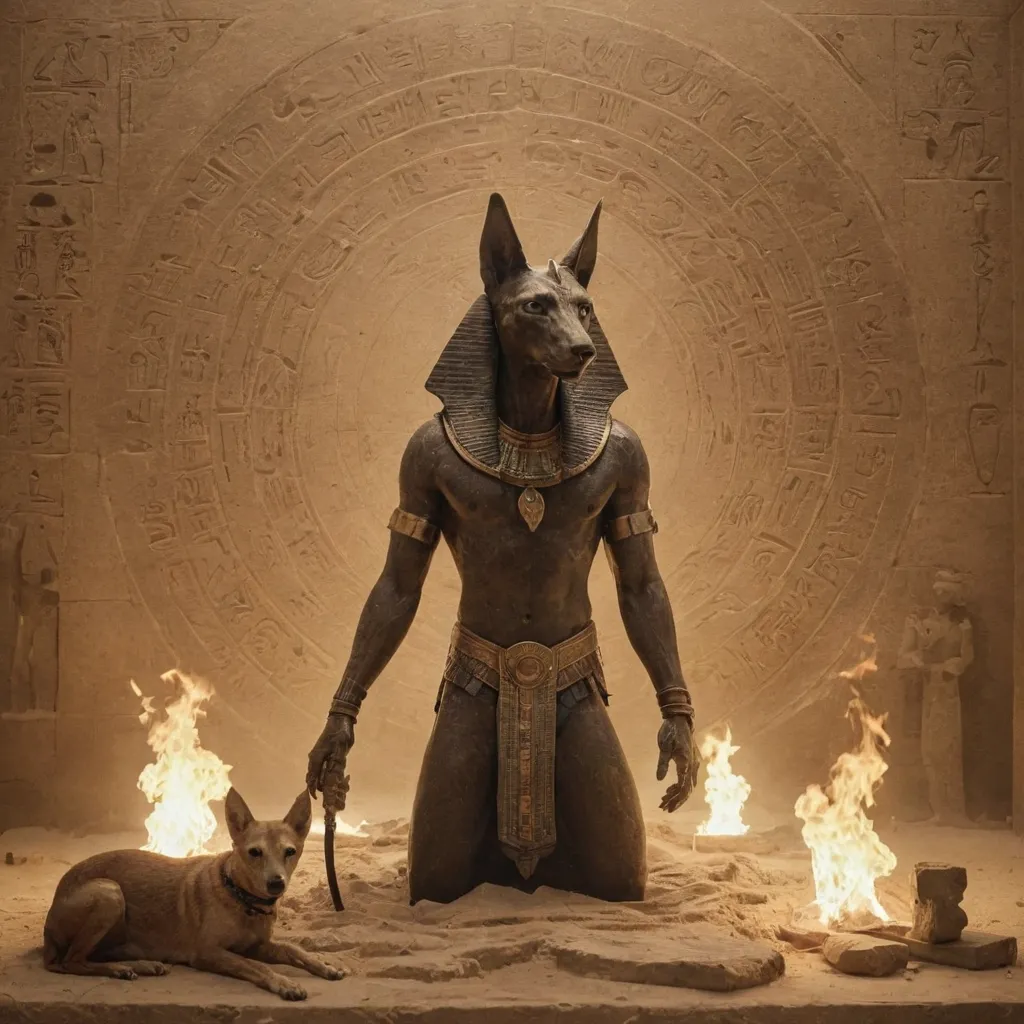
The Rise of Anubis The Jackal God
Anubis, the enigmatic jackal-headed deity, has long captivated the imaginations of scholars and enthusiasts alike. As the ancient Egyptian god of the afterlife, Anubis played a crucial role in guiding the deceased through the perilous journey of the underworld. The rise of Anubis as a revered figure in the Egyptian pantheon is a testament to the enduring power of this ancient belief system.
During the Old Kingdom (c. 2686-2181 BCE), Anubis emerged as a central figure in the funerary rituals and beliefs of the ancient Egyptians. As the god responsible for the embalming process and the protection of the dead, Anubis was intimately connected with the transition from life to the afterlife. The jackal-headed deity was often depicted standing guard over the tomb or presiding over the weighing of the heart ceremony, a crucial step in the judgment of the soul.
The association between Anubis and the jackal can be traced back to the ancient Egyptians' observation of these scavengers, which were often seen prowling around cemeteries and tombs. The jackal's nocturnal nature and proximity to the dead made it a natural symbol for the god who oversaw the journey to the afterlife. This symbolic connection was further reinforced by the jackal's ability to navigate the liminal spaces between the world of the living and the dead.
As the cult of Anubis grew in prominence, the god's influence expanded beyond the realm of the afterlife. Anubis was also revered as a protector of the dead, a guide for the soul, and a deity associated with healing and transformation. The mummification process, which was essential for the preservation of the body and the successful transition to the afterlife, was also under the purview of Anubis.
The widespread veneration of Anubis can be seen in the numerous temples and shrines dedicated to the god throughout ancient Egypt. From the famous necropolis of Saqqara to the temple complexes of Abydos and Abusir, Anubis was a ubiquitous presence in the religious and funerary landscape of the Nile Valley.
Anubis Presides Over the Afterlife
Anubis, the enigmatic Egyptian deity associated with the afterlife, has long been revered for his profound wisdom and his unwavering guardianship of the deceased. As the god who presides over the afterlife, Anubis plays a crucial role in the journey of the soul, ensuring a seamless transition from the mortal realm to the eternal.
At the heart of Anubis's domain is the process of mummification, a meticulous ritual that was believed to preserve the physical form of the deceased, allowing the soul to return to its rightful dwelling. Anubis, the jackal-headed god, was responsible for overseeing this intricate process, guiding the embalmers and ensuring the proper preservation of the body. Through this sacred duty, Anubis became the gatekeeper between the living and the dead, a bridge between the physical and the spiritual realms.
Beyond his role in mummification, Anubis was also revered as the overseer of the weighing of the heart ceremony, a pivotal moment in the journey of the soul. In this ritual, the deceased's heart was weighed against the feather of Ma'at, the goddess of truth and justice. If the heart was found to be pure and free from sin, the soul was granted passage into the afterlife. Anubis, with his keen eye and unwavering judgment, presided over this sacred ceremony, ensuring the integrity of the process and the fair assessment of the individual's deeds.
Anubis's influence extends even further, as he was also believed to guide the deceased through the various challenges and obstacles they would face in the afterlife. The ancient Egyptians believed that the journey of the soul was fraught with peril, and Anubis was there to provide protection, guidance, and support. From navigating the treacherous underworld to facing the judgement of the gods, Anubis's presence was a constant and reassuring force, ensuring the safe passage of the deceased to their eternal resting place.
Unraveling the Symbolism of Anubis
Anubis, the enigmatic Egyptian god of the afterlife, has long been a subject of fascination for historians, archaeologists, and spiritual seekers alike. As the divine guardian of the dead, Anubis' symbolism is deeply rooted in the ancient Egyptian belief system, offering a wealth of insight into the mysteries of the afterlife and the intricate tapestry of Egyptian mythology.
At the core of Anubis' symbolism lies his role as the protector of the dead. Depicted with the head of a jackal or a dog, Anubis was believed to guide the deceased through the underworld, ensuring a safe passage to the afterlife. This canine representation is not mere symbolism; the jackal was revered in ancient Egypt for its association with the necropolis, where these scavengers would roam among the tombs and burial sites.
Beyond his role as a guide, Anubis was also responsible for the embalming and mummification process, a sacred ritual that was believed to prepare the deceased for their journey to the afterlife. The god's connection to the process of mummification is reflected in his epithet, "He Who is Foremost of the Westerners," a reference to his role in overseeing the preparation of the dead for their final resting place in the western necropolis.
Anubis' iconography is equally rich and symbolic. The black color of his jackal-like head is often interpreted as a representation of the fertile black soil of the Nile River valley, a symbol of regeneration and rebirth. Additionally, the scales he is often depicted holding, used to weigh the heart of the deceased against the feather of truth, symbolize the judgment of the soul in the afterlife.
The significance of Anubis extends beyond his physical representation, as he is also associated with a number of important concepts in Egyptian mythology. As the god of the necropolis, Anubis was believed to have the power to protect the dead from harm and ensure their successful transition to the afterlife. This role was particularly crucial in the Abydos Passion Play, a ritual reenactment of the death and resurrection of Osiris, the god of the underworld.
Furthermore, Anubis' connection to the concept of the ka, the vital essence or spirit of an individual, is particularly noteworthy. In the afterlife, Anubis was believed to be responsible for the preservation and protection of the ka, ensuring that the deceased's spirit could continue to exist in the afterlife.
Anubis Guides the Souls of the Departed
As the Egyptian god of the afterlife, Anubis holds a paramount role in the journey of the dead. This jackal-headed deity oversees the crucial process of mummification, ensuring the preservation of the physical vessel that will house the soul in the afterlife. But Anubis' influence extends far beyond the embalming chambers, as he guides the departed through the treacherous realms of the underworld.
At the heart of this sacred responsibility lies the Weighing of the Heart ceremony, a pivotal moment in the ancient Egyptian belief system. Anubis is tasked with meticulously weighing the heart of the deceased against the feather of Ma'at, the goddess of truth and justice. This delicate balance determines the fate of the soul, as a heart that is found wanting is devoured by the devouring demon Ammit, condemning the individual to eternal oblivion.
For those who pass the test, Anubis assumes the role of psychopomp, the divine escort who leads the soul through the intricate underworld landscapes. This journey is fraught with peril, as the deceased must navigate treacherous pathways, overcome malevolent entities, and ultimately reach the realm of Osiris, the lord of the underworld. Anubis, with his keen senses and intimate knowledge of the afterlife, guides the soul, ensuring a safe passage and the eventual reunion with the divine.
In this capacity, Anubis is often depicted holding the was scepter, a symbol of power and dominion over the realms of the dead. His presence is a reassurance to the departed, a reminder that they are not alone in their final journey, but accompanied by a deity whose primary concern is the well-being of their soul.
Beyond his role as a guide, Anubis is also revered as a protector of the dead. He is believed to watch over the mummified remains, safeguarding them from desecration and ensuring the preservation of the physical form. This vital function underscores the importance of Anubis in the ancient Egyptian belief system, where the sanctity of the body was inextricably linked to the survival and prosperity of the soul in the afterlife.
The Timeless Wisdom of Anubis
The timeless wisdom of Anubis, the Egyptian god of the afterlife, has captivated the hearts and minds of countless individuals throughout the ages. As the guardian of the dead and the custodian of the embalming process, Anubis' profound insights into the nature of life, death, and the journey of the soul hold a profound significance for those seeking to understand the mysteries of the afterlife.
One of the core teachings of Anubis is the importance of maintaining a balanced and righteous life. In the Egyptian tradition, the deceased would undergo a meticulous process of judgment, where their heart would be weighed against the feather of Ma'at, the goddess of truth and justice. This symbolic act underscores the belief that a life lived with integrity, compassion, and a dedication to the greater good is essential for a peaceful and fulfilling transition into the afterlife.
Anubis' wisdom also emphasizes the need for self-reflection and introspection. As the god responsible for guiding the souls of the departed, Anubis understood the importance of understanding one's own strengths, weaknesses, and the impact of one's actions on the world. By engaging in this process of self-discovery, individuals can cultivate a deeper sense of purpose, and align their lives with the principles of truth, justice, and spiritual growth.
Moreover, the wisdom of Anubis extends to the importance of honoring the cycle of life and death. Rather than viewing death as an end, Anubis' teachings encourage a more holistic understanding of the human experience, where death is seen as a natural transition, a necessary step in the ongoing journey of the soul. By embracing this perspective, individuals can find solace and meaning in the face of loss, and approach the afterlife with a sense of reverence and anticipation.

